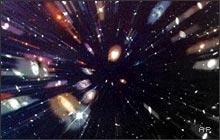Advertisement
Forget the Big Bang Theory
Resume
We all know the story, delivered in grade school textbooks across the country, of how the universe began. The Big Bang. Fourteen billion years ago. Space and time and everything, exploding into being in a flash, and still exploding as celestial bodies race apart across the cosmos.
Well, maybe so. But the Big Bang theory has taken its lumps in recent years.
Now, renegade physicists are making a new case. That it didn't all start in an instant. That there is no beginning, and no end. And those are fighting words in the halls of science.
This hour On Point: the big rumble over the Big Bang.
Quotes from the Show:
"I think the challenge we're raising is that the usual picture of the Big Bang is based on an assumption which is that time, space, matter, energy, everything began at the Big Bang. And that assumption was made in the 60s when people got the first strong observational evidence that the Big Bang happened. But it's really just an assumption and our point of view has come out of new development in physics which are enabling us to describe the behaviour of matter in very extreme conditions such as were present around the Bang. And what we're seeing is that the Big Bang doesn't have to be the beginning of time. It's perfectly possible that the Big Bang was just a violent event in a pre-existing universe." Neil Turok
"This picture emerged out of a new understanding of the laws of physics which is called M Theory. ... [a]ccording to this picture, the world may be comprised of two objects called branes, short for membranes. ... And so the picture is that we live in a three-dimensional world, just the height, width and length of ordinary space but separated from our dimensions by a very tiny distance are another three-dimensions and so the whole world is four-dimensional in this picture and these two sets of dimensions can actually collide with each-other. What we discovered is, if they do collide, then something like a Big Bang happens but the density of matter and the size of the universe is not zero at that point. It's as if two objects clash together and this clash is what releases radiation which fills space." Neil Turok
"In the what I would regard as the conventional version of the inflationary theory, the Big Bang was also not in that theory the origin of everything but rather one had a very long period of this exponential expansion of the universe, which is what inflation means, and, at different points, different pieces of this inflating universe had stopped inflating and become what I sometimes call pocket universes." Alan Guth
"... What we call the Big Bang was almost certainly not the actual origin of time in either of the theories that we're talking about. ... The main difference I think [between the inflationary theory and Neil and Paul's theory] is the answer to the question of what is it that made the universe large and smooth everything out. ... The inflationary version of cosmology is not cyclic. ... It goes on literally forever with new universes being created in other places. The inflationary prediction is that our region of the universe would become ultimately empty and void but meanwhile other universes would srput out in other places in this multiverse. " Alan Guth
"There's a little more resistance to the cyclic model but maybe that's because of the successes so far of inflation. Yet, we do know that there are fundamental things about the early universe and the Big Bang that we don't understand. ... String theory or M theory or these other models of fundamental physics are going to be important in terms of formulating that early universe picture but they're not complete yet." Janna Levin
Guests:
Neil Turok, professor of mathematical physics at Cambridge University. He is the co-author of the new book, "Endless Universe: Beyond the Big Bang."
Alan Guth, professor of physics at the Massachusetts Institute of Technology. He is the author of "The Inflationary Universe: The Quest for a New Theory of Cosmic Origins."
Janna Levin, professor of physics and astronomy at Barnard College. She is the author of "How the Universe Got Its Spots: Diary of a Finite Time in a Finite Space."
This program aired on May 31, 2007.